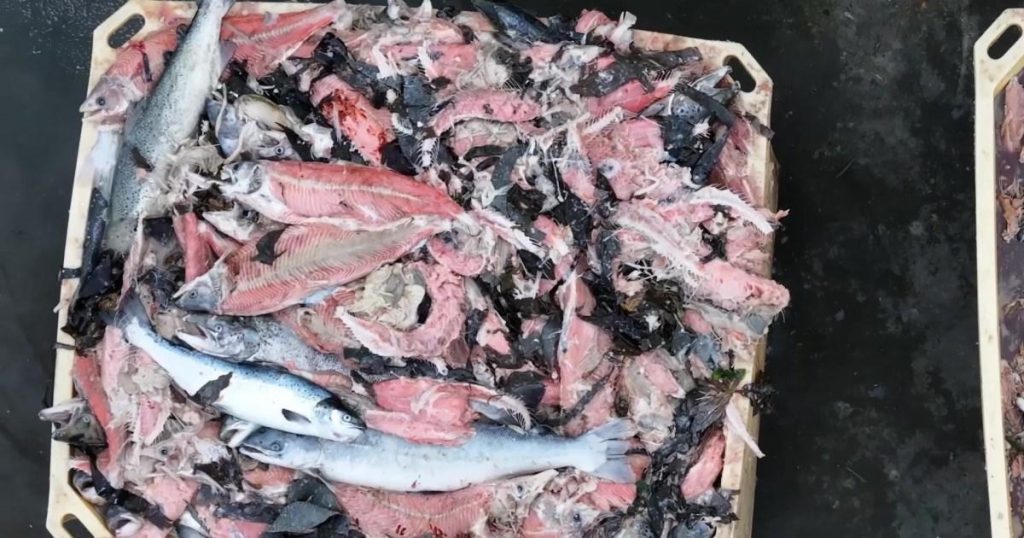The salmon farming industry in Scotland has been dealt a devastating blow by a massive jellyfish attack, resulting in the death of over 200,000 salmon. This incident, attributed to the String of Pearls Jellyfish (Apolemia uvaria), also known as string jellyfish or barbed wire jellyfish, is believed to be the worst of its kind in Scotland. The jellyfish, with their venomous tentacles, inflicted severe burns on the salmon’s skin, eyes, and gills. Trapped within the confines of densely packed pens, the salmon were unable to escape the relentless assault, leaving them with gaping wounds and extreme stress, highly susceptible to infection and disease, and ultimately leading to a slow and agonizing death for many. This incident follows a similar devastating attack on Norwegian salmon farms in the winter of 2023, where over three million salmon perished due to the same jellyfish species.
The graphic footage released shortly before the official detection of the attack vividly portrays the extent of the devastation, showing tons of dead salmon, ranging in size, being removed from the affected farms. This alarming event has sparked urgent calls for increased scrutiny and stricter regulations within the salmon farming industry. Critics argue that current practices are failing to adequately address environmental challenges and that the industry’s reliance on open-net farming exposes farmed salmon to unpredictable and potentially catastrophic threats, particularly in the face of a changing climate and increasingly volatile marine ecosystems.
Environmental advocates and critics of open-net salmon farming point to this jellyfish attack as a stark illustration of the inherent vulnerabilities of this farming method. They argue that confining large numbers of fish in open-net pens creates an environment ripe for disease outbreaks and makes them highly susceptible to environmental hazards like jellyfish blooms. The inability of the salmon to escape the jellyfish within the confined pens exacerbates the impact of these attacks. This incident, following the previous large-scale die-off in Norway, underscores the escalating risk posed by jellyfish blooms to the salmon farming industry, particularly as climate change continues to disrupt marine environments and potentially increase the frequency and intensity of such events.
The incident has ignited a debate about the future of salmon farming and the need for more sustainable and resilient practices. Proponents of stricter regulations and alternative farming methods, such as closed-containment systems, argue that these changes are essential to mitigate the environmental risks and improve animal welfare. Closed-containment systems, which isolate farmed fish from the surrounding marine environment, offer greater protection from predators, parasites, and harmful algal blooms, and also minimize the impact of fish waste and uneaten feed on the surrounding ecosystem. The current reliance on open-net farming, they argue, is unsustainable and leaves the industry vulnerable to catastrophic events like this jellyfish attack.
While the salmon farming industry implements monitoring programs to track jellyfish populations and assess water quality, critics argue that these measures are insufficient to address the underlying problem of open-net farming’s vulnerability to environmental threats. The intensive monitoring programs employed by some companies, while valuable for early detection and assessment, do not provide a solution to prevent jellyfish attacks or mitigate the damage once an attack occurs. The daily tracking efforts, including water sampling, species identification, and temperature and oxygen monitoring, provide valuable data but do not offer a protective barrier against the jellyfish. The focus, according to critics, should be on transitioning away from open-net farming towards more sustainable and resilient practices.
The Scottish government, while acknowledging the importance of farmed fish health, admits to lacking comprehensive information on the specific jellyfish species involved in every mortality incident. This information gap further emphasizes the need for more robust monitoring and research to better understand the complex interactions between jellyfish blooms, environmental factors, and salmon health. While the salmon farming sector is working to better understand the impact of jellyfish, critics argue that more decisive action is needed to protect farmed salmon and the surrounding marine environment. This incident highlights the urgent need for a comprehensive review of current farming practices and a shift towards more sustainable and resilient aquaculture methods. The continued reliance on open-net farming, in the face of increasing environmental challenges, poses significant risks to the industry’s long-term viability and the health of marine ecosystems.


